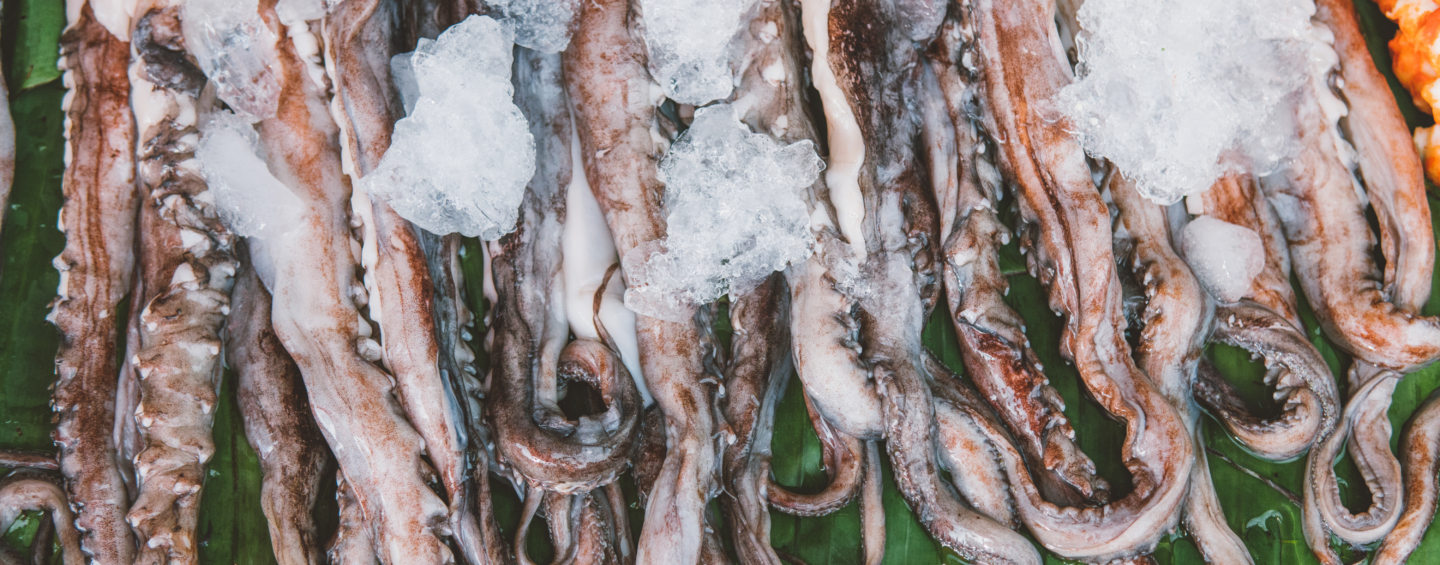If you sell squid, chances are you already know there are three squid species that dominate global production, trade, and demand: Jumbo Flying Squid (Dosidicus gigas), Argentine Shortfin Squid (Illex argentinus), and Japanese Flying Squid (Todarodes pacificus). But you may not know that the competition between them for the title of “most sustainable” is starting to heat up.
These three species represent more than 60 percent of global squid production, and the demand from markets with strong sustainability expectations, such as North America and the EU, keeps growing. These two facts, together with the commodity nature of seafood products made from these species, have fired the starting gun in a race aimed at fulfilling the sustainability demands of global retail powers from the EU and North America.
During the last couple of years, we have seen a crop of promising incipient squid sustainability initiatives. This emerging effort does not yet have a significant impact in global squid production; almost anyone involved in this business is aware of the efforts taking place in geographies such as the US (single MSC-certified squid fishery), the Chinese Shantou-Taiwan bank (basic FIP), and New Zealand (FIP towards MSC), but the impact that these initiatives have at a global scale is trivial in comparison with the potential of the three squid racing teams.
Of the three, Japanese Flying Squid has had the pole position in this race almost from the start, with a good example of a fishery managed in a sustainable and responsible manner under Japanese jurisdiction, as per Monterey Bay Aquarium’s Seafood Watch program. The work serves as an example that other fishing nations (Korea and China) could follow while driving this sustainability race.
Despite that advantage and the improvement effort promoted in China by companies such as Sea Farms, Panapesca, Aquastar, and Quirch Foods, it seems the tempestuous start of Jumbo Flying Squid has been enough to take the lead in the race. D. gigas is the focus of a public FIP in Mexico, as well as strong and reliable movements in Peru, where sooner than later a comprehensive FIP will be announced after a couple of crazy years of positive movements and news on the fishery. The creation of CALAMASUR (Committee for the Sustainable Management of Jumbo Flying Squid), a group formed by fishermen, academia, and industry stakeholders from Peru, Chile, and Ecuador, has fostered movements within the South Pacific Regional Fisheries Management Organization (RFMO) toward a more sustainable management of this resource.
Such strength is not present in the other two major teams in this race (I. argentinus and T. pacificus), with the Argentine Shortfin squid being the one with a more challenging future in terms of coordinated management. Despite the political dispute between Argentina and the UK, a certain amount of progress has been made since the May meeting of the SAFC (South Atlantic Fishing Commission), where both nations agreed to run joint scientific research campaigns to gather new fishery status data. But the relevance of unregulated and unreported catches outside the Argentinian EEZ is the most important point for the future of sustainability programs involving the Illex Argentinus fishery in the SW Atlantic.
Concerns about this situation are well-established among those companies (mostly from Spain) that have been historically using this species as the major source of raw material for their business and also for those with fishing assets on the fishing grounds of Argentina. That was the subject of a recent meeting SFP held with Iberconsa, Cabomar, Congalsa, and Nueva Pescanova a few weeks before the CONXEMAR trade show. The show itself proved to be a great opportunity to expand this conversation with others that are facing similar future scenarios and are willing to use their weight and influence to create a competitive Argentine Shortfin Squid sustainability racing team.
The warm-up has finished and the sustainable squid race has started, with rewards from the markets. Nevertheless, the journey for major runners will be hard and will require international cooperation and agreements in order to secure a winning sustainable future.

